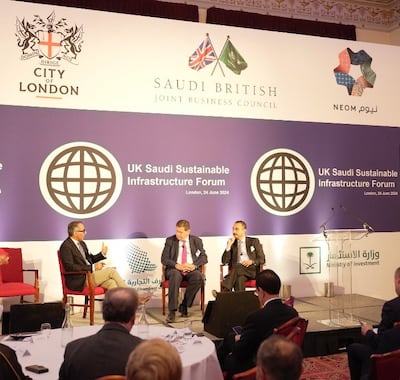Saudi Arabia's Minister of Investment, Khalid Al Falih, has told an event in London that the kingdom's development plan is on its way to implementation and ahead of schedule.
“We're more than halfway through the implementation of Vision 2030, and I'm glad to report that we're ahead of schedule on all aspects of the implementation,” he told the UK-Saudi Sustainable Infrastructure Forum.
Vision 2030, Saudi Arabia's plan to transform the country from heavy reliance on oil and gas revenue to a technologically-advanced economy powered by renewable energy through a series of giga-projects involving trillions of dollars.
Saudi leaders, including Finance Minister Mohammed Al Jadaan, have recently hinted that some parts of the plan have been scaled back.
Nonetheless, the mood at the summit, which was convened by the City of London Corporation and the Saudi-British Joint Business Council, was distinctly upbeat and served as a further opportunity to expand the trade relationship between the kingdoms.
Mr Al Falih told the conference that Vision 2030 has been a boon for the Saudi economy, as the country uses it as a pathway to build a future beyond oil and gas.
“Our GDP has grown by some 70 per cent since we launched Vision 2030. We have moved from number 20 on the rankings of the G20 countries to number 16.
“We are the second-fastest growing economy within the G20 at close to 7 per cent annualised GDP growth since launching Vision 2030.
'The land of the future'
Emphasising that the kingdom is open for business, Mr Al Falih added that foreign direct investment by some measures has quadrupled in the past seven years and the number of foreign licences granted has increased by a factor of 10.
Using the tourism sector to illustrate how much progress Saudi Arabia has made towards its Vision 2030 goals, Mr Al Falih said the original target to attract 100 million visitors by 2030 was achieved last year and “the target has moved to 150 million visitors”.
“Projects that were only perceived as dreams are well under construction.”

One of those projects is, of course, Neom in the north-west of Saudi Arabia. Neom has been singled out to be the “land of the future”, a $500 billion scheme to build 10 cities that have ultra-modern urbanisation technology, a thriving and sustainable economy with a conservation element that denotes that “nature comes first”.
One of the most high-profile and ambitious projects is The Line, a “cognitive” city stretching for 274km across the Neom region, with no cars and no emissions, because it will run on 100 per cent renewable power.
Although, some of the plans for Neom's projects like The Line have been scaled back of late, the enthusiasm for them among the summit delegates is undiminished.
“Neom is the world's largest sustainable region currently under development on earth,” said Nadhmi Al Nasr, chief executive of Neom.
“We have the unique advantage of incorporating the latest innovations and technology into everything we do from the start.
“Ninety-five per cent of Neom will remain conserved for nature and untouchable,” he added.
In order for Neom and the 13 other giga infrastructure projects within Vision 2030 to blossom from dreams to reality, private sector involvement is crucial at almost every level, according to Dr Manar Al Moneef, chief investment officer at Neom.
“The private sector plays a significant role, will join us and be part of this journey,” she said.
“Our aim is work with them hand-in-hand to actually structure opportunities in a way that makes sense.
“Today, we have more than 150 initiatives identified across various sectors and regions. Each of these initiatives have multiple opportunities that we're open to discuss with the private sector.”
'A hub for global finance'

It is hoped that many of those discussions will take place with British companies, and delegates at the summit emphasised the importance of London to Saudi Arabia in terms of the business and economic relationship.
“London has become, in my opinion, the world's financial centre,” Mr Al Falih told the summit.
“We look at London as a hub for global finance,” he said, adding that Brexit has afforded London an opportunity to act as a conduit for capital flowing into growing markets like Saudi Arabia.
“There is already strong collaboration between the London Stock Exchange and many actors in the Saudi market.”
Jane Goodland, group head of sustainability at London Stock Exchange Group, agreed, saying that London's capital market has got “huge potential to partner with Saudi in their Vision 2030".
“When think about green bonds, and sustainable bonds specifically, we believe that there is a very bright future for these types of instruments to meet some of the capital needs, which we know are going to be quite significant, not just in Saudi Arabia but globally as we all try to tackle climate change and transition into a low carbon economy that we need to do.”

Illustrating this point in the Saudi context are the inaugural green bonds issued by PIF (Public Investment Fund) of Saudi Arabia, which were eight times oversubscribed when launched on the London Stock Exchange.
“That's just going to grow and grow,” said Ms Goodland, “as we see more case studies and more examples of how these projects get financed.”
That said, for Dr Al Moneef, investing in Neom is so much more than just bottom-line profit.
“Neom is a once-in-a-lifetime opportunity,” she said.

“If you really care about making a difference; if you really care about introducing something new; if you really care about green and sustainability, that [Neom] is the place to be.”
“We have every opportunity available to you – the size you want and the scale you want. If you're talking about $100 million or $1 billion, everything is available at a structure that makes you comfortable as well as the banks. So, if you want to make that is the place to be,” she added.
The general message to the British company executives and entrepreneurs in the summit's audience about doing business in Saudi Arabia was largely summed up by Prince Khalid bin Bandar Al Saud, Saudi ambassador to the UK.
“Everything is there to provide the opportunity,” he said.
“All that's missing is more people coming across, and I think that it won't take long for anyone going to Saudi to find an opportunity and if they can't find it, they're probably doing the wrong thing.”











